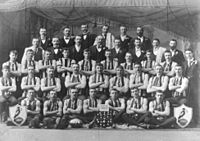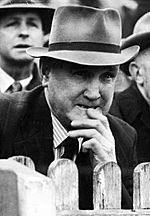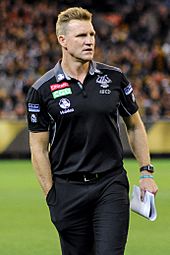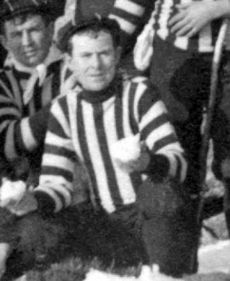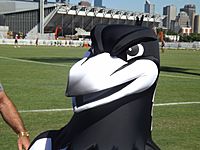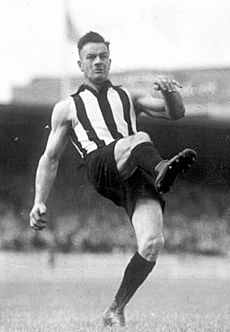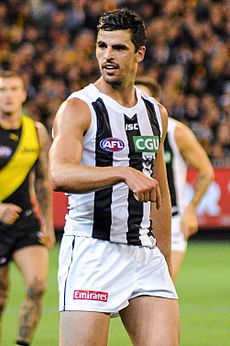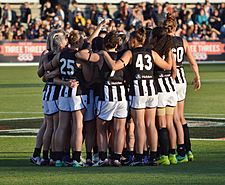Collingwood Football Club facts for kids
Quick facts for kids Collingwood Football Club |
||||
|---|---|---|---|---|
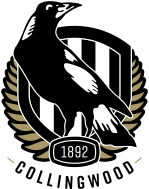 |
||||
| Names | ||||
| Full name | Collingwood Football Club Limited | |||
| Nickname(s) | Magpies, Pies, Woods, Woodsmen | |||
| Motto | Floreat Pica (May The Magpie Flourish) |
|||
| 2024 season | ||||
| Home-and-away season | 9th | |||
| Leading goalkicker | Bobby Hill (30 goals) | |||
| Copeland Trophy | Nick Daicos | |||
| Club details | ||||
| Founded | 12 February 1892 | |||
| Colours | Black, white |
|||
| Competition | AFL: Senior men AFLW: Senior women VFL: Reserves men VFLW: Reserves women |
|||
| President | Barry Carp | |||
| CEO | Craig Kelly | |||
| Coach | AFL: Craig McRae AFLW: Sam Wright VFL: Andy Otten VFLW: Tom Cashin |
|||
| Captain(s) | AFL: Darcy Moore AFLW: Ruby Schleicher VFL: Sam Glover VFLW: Caitlin Bunker |
|||
| Premierships | Seniors VFL/AFL (16)
VFL/AFL Reserves (7)
|
|||
| Ground(s) | AFL: Melbourne Cricket Ground (100,024) AFLW/VFLW: Victoria Park (10,000) VFL: Victoria Park & Olympic Park (3,500) |
|||
| Former ground(s) | Victoria Park (1892–1999) | |||
| Training ground(s) | AIA Centre (indoor) Olympic Park Oval (outdoor) | |||
| Uniforms | ||||
|
||||
| Other information | ||||
| Official website | collingwoodfc.com.au | |||
The Collingwood Football Club, often called the Magpies or Pies, is a professional Australian rules football club. It is based in Melbourne, Victoria, Australia. The club plays in the Australian Football League (AFL), which is the top competition for the sport.
Collingwood was started in 1892 in the Melbourne suburb of Collingwood. The club first played in the Victorian Football Association (VFA). In 1896, Collingwood and seven other teams left the VFA to form the Victorian Football League (VFL). This league is now known as the AFL.
The club's original home was Victoria Park. Today, Collingwood plays its home games at the Melbourne Cricket Ground. Its main offices and training areas are at Olympic Park Oval and the AIA Centre.
Collingwood has played in a record 45 VFL/AFL Grand Finals. They have won 16 premierships, which is tied for the most wins. They have also had two draws and 27 losses in Grand Finals. Collingwood is one of Australia's most popular sports teams. In 2023, they had the most members in the AFL, with 106,470 people joining the club.
The club's song, "Good Old Collingwood Forever", is the oldest team song still used in the AFL. It dates back to 1906. Collingwood's home guernsey (jersey) has black and white stripes. These colors are based on the Australian magpie. Historically, Collingwood's biggest rivals are the nearby clubs Carlton and Richmond. Since 1995, they also have a strong Anzac Day rivalry with Essendon.
Collingwood also has a reserves team in the Victorian Football League. They have women's teams in the AFL Women's and VFL Women's competitions. From 2017 to 2023, the club also had a netball team called Collingwood Magpies (netball).
Contents
Club History
How Collingwood Started
The Collingwood Football Club was officially formed on February 12, 1892.
Collingwood played its first game in the Victorian Football Association (VFA) on May 7, 1892. They played against Carlton. The club won its first VFA Premiership in 1896.
In 1897, Collingwood and seven other VFA clubs created a new league. This was called the Victorian Football League (VFL). Collingwood won its first VFL premiership in 1902. They beat Essendon by 33 points in the 1902 VFL Grand Final.
The "Machine" Years: 1920s and 1930s
Collingwood was very successful in the 1920s and 1930s. They played in 13 Grand Finals during this time. Collingwood won six premierships, including a record four in a row from 1927 to 1930. They also won two more in 1935 and 1936.
The coach during this period was Jock McHale. He coached the team from 1912 to 1949. Several Collingwood players won the Brownlow Medal during this time. These included Syd Coventry (1927), Albert Collier (1929), and Harry Collier (1930). Because of their great success, the team was nicknamed "The Machine."
The 1927–30 Collingwood team had an amazing winning record. They won about 86% of their games over those four seasons. In 1929, they became the only team in history to go through a regular season without losing a single game. Collingwood is still the only club in VFL/AFL history to win four premierships in a row.
Success in the 1950s
In the 1950s, Collingwood won two premierships, in 1953 and 1958. The 1958 premiership was very special. It stopped the Melbourne Football Club from winning four premierships in a row, which would have matched Collingwood's record.
However, the 1958 premiership was Collingwood's last for 32 years. The club faced many Grand Final losses in the following decades.
The "Colliwobbles" (1959–1989)
Between 1960 and 1981, Collingwood lost eight Grand Finals, often by small margins. This led to the idea that the club struggled in big games, which was jokingly called the "Colliwobbles." After Collingwood won the premiership in 1990, club legend Lou Richards symbolically "buried" the Colliwobbles.
Breaking the Drought: 1990 Premiership
The 1990 premiership team was coached by Leigh Matthews and captained by Tony Shaw. They had a big win against Essendon, winning by 48 points. This ended a 32-year wait for a premiership. A famous moment from the game is Darren Millane, a club great, holding the ball up high after the final siren. He sadly passed away a year later.
After this big win, the club had some tough years. They finished last in 1999. Tony Shaw became coach in 1996 but resigned after poor results in 1998 and 1999.
The Malthouse Era: 2000–2011
President Eddie McGuire helped bring in new head coach Michael Malthouse in 1999. This decision helped the club improve a lot. With new players like Paul Licuria, Alan Didak, Anthony Rocca, and Nathan Buckley, Collingwood quickly moved up the ladder.
In 2002, Collingwood played against the reigning champions, Brisbane, in the Grand Final. They were not expected to win but only lost by 9 points. Their captain, Buckley, won the Norm Smith Medal for being the best player in the Grand Final, even though his team lost. They lost to Brisbane again in the 2003 Grand Final.
After these losses, Collingwood struggled for a couple of years. They returned to the finals in 2006 and 2007. In 2007, they had a very close preliminary final against Geelong, losing by just five points. Nathan Buckley retired at the end of 2007.
In 2010, Collingwood finished first in the regular season. They reached the Grand Final against St Kilda. The first game was a draw, which meant they had to play a grand final replay. Collingwood won the replay by 56 points. Nick Maxwell was the captain, and Scott Pendlebury won the Norm Smith Medal.
Collingwood finished first again in 2011. They made it to the Grand Final but lost to Geelong by 38 points. After this, Michael Malthouse left the club. Dane Swan won the 2011 Brownlow Medal in 2011, setting a new record for votes. Malthouse coached the club to eight finals series and four Grand Finals in 12 years.
Nathan Buckley as Coach: 2012–2021
Nathan Buckley, a great Collingwood player, became head coach in 2012. Collingwood continued to do well at first, reaching the preliminary final in 2012. They also made the finals in 2013.
Over the next few years, the team changed many players. They brought in younger talent, but their performance declined. Buckley faced a lot of pressure, but the club decided to keep him as coach in 2017.
New players like Taylor Adams, Adam Treloar, and Jordan De Goey joined older stars like Pendlebury and Steele Sidebottom. Collingwood improved greatly in 2018, jumping from 13th to 3rd place. They beat reigning premiers Richmond in the preliminary final. However, they lost the Grand Final to West Coast by just five points.
In 2019, Collingwood had another strong season, finishing fourth. They lost a close preliminary final to GWS. In 2020, they finished 8th.
In 2017, Collingwood also started a team in the new AFL Women's competition. They also had a netball team, Collingwood Magpies Netball, from 2017 to 2023.
"Do Better" Report
In 2020, Collingwood asked for an independent review into claims of racism at the club. The report was released in February 2021. It highlighted that Collingwood had a history of racism that caused harm to Indigenous and African players.
The club's president, Eddie McGuire, initially said it was a "proud day" for the club. Many people criticized his comments, including the AFL CEO and former players. McGuire later apologized. On February 4, 2021, 150 Collingwood players from the men's and women's teams wrote an open letter. They apologized to anyone who had been hurt by racism at the club. McGuire stepped down as president on February 9, 2021.
Buckley left his coaching role after Round 13 of the 2021 AFL season. Assistant coach Robert Harvey took over for the rest of the season.
Craig McRae Era: 2022–Present
In September 2021, Craig McRae became the head coach for the 2022 season. In his first year, McRae led the team from 17th place to 4th place. They had an 11-game winning streak and set an AFL record with 11 wins by less than 12 points. Collingwood lost two of their three finals games in 2022 by very small margins. McRae won the AFL Coaches Association's Senior Coach of the Year Award for 2022.
The 2023 season saw a change in leadership. Scott Pendlebury stepped down as captain after holding the role from 2014 to 2022. Darcy Moore was voted as the new captain.
Collingwood aimed to build on their 2022 success in 2023. They added new players like Tom Mitchell, Bobby Hill, Billy Frampton, and Dan McStay. The team had a very successful season under Craig McRae, winning 18 games and finishing first on the ladder.
In the 2023 AFL Finals, Collingwood beat Melbourne by 7 points in the Qualifying Final. They then defeated the Giants by 1 point in the preliminary final. This earned them a spot in the 2023 AFL Grand Final. In a very close game, Collingwood beat Brisbane by 4 points to win the 2023 AFL Premiership. This win brought their total premierships to 16, matching the league record.
The 2024 season was not as successful for the reigning champions. Collingwood started poorly, losing their first three games. They then recovered, losing only once in the next eleven games. However, they finished the season with mixed results, winning only four of their last nine matches. Collingwood finished ninth, missing the finals. They were the third reigning premier in four years to miss the finals.
Club Identity
Guernsey (Jersey)
Collingwood has always worn a guernsey with black and white vertical stripes. The most famous design is white with three black vertical stripes. The current home guernsey is mostly black with white stripes on the front and lower back. It has white numbers. The main away guernsey is the opposite: mostly white with black stripes and black numbers. This is worn when playing against teams with dark jerseys.
Collingwood used to wear a white guernsey with black stripes. They switched to the black guernsey with white stripes in 2001. Nike makes the Magpies' uniforms.
Team Song
"Good Old Collingwood Forever" is the team song of the Collingwood Football Club. Player Tom Nelson wrote the lyrics in 1906. This makes it the oldest team song still used in the AFL. It is sung to the tune of "Goodbye, Dolly Gray". This song was popular during the Boer War and World War I. Collingwood's song is the only AFL team song that mentions the "barracker," which is an Australian rules football term for a fan.
The version of the song played at games was recorded in 1972 by the Fable Singers. The lyrics are:
- Good old Collingwood forever,
- They know how to play the game.
- Side by side, they stick together,
- To uphold the Magpies name.
- See, the barrackers are shouting,
- As all barrackers should.
- Oh, the premiership's a cakewalk,
- For the good old Collingwood.
In 1983, the line "Oh, the premiership's a cakewalk" was briefly changed. This was because the club had not won a premiership for a long time. But the change was not popular, and the original line was quickly brought back.
Rivalries
Carlton is considered Collingwood's biggest rival. Richmond is also a close rival.
Collingwood has also had a strong Anzac Day rivalry with the Essendon Football Club since 1995. Collingwood has won this game 17 times, Essendon 11 times, and there have been two draws.
Richmond Rivalry
Richmond and Collingwood are neighboring clubs. They were both very successful in the late 1920s and early 1930s. They played against each other in five Grand Finals between 1919 and 1929. Collingwood won four of these. In the 1980 Grand Final, Richmond beat Collingwood by a large margin.
Games between these two clubs always attract large crowds. In 2018, they played three times, with crowds of over 72,000, 88,000, and 94,000 people. Collingwood beat Richmond in the preliminary final that year, which made the rivalry even stronger.
Melbourne Rivalry
The rivalry between Collingwood and Melbourne was strongest between 1955 and 1964. They played in five Grand Finals against each other. This included the 1958 Grand Final, where Collingwood's win stopped Melbourne from matching Collingwood's record of four premierships in a row. This rivalry is still strong and they play each other every year on the King's Birthday public holiday.
Home Grounds and Training
Collingwood Football Club trained and had its offices at Victoria Park from 1892 until 2004. In 2004, the club moved its main training and office base to the Melbourne Sports and Entertainment Centre at the Olympic Park Complex. This facility is now known as 'The AIA Centre' due to sponsorship.
The club's original home ground for AFL games was Victoria Park until 1999. Since 2000, the club's main home ground has been the Melbourne Cricket Ground (MCG). They also play two home games a year at Marvel Stadium.
Supporters
Collingwood is a working-class suburb. Traditionally, many of the club's supporters came from working-class backgrounds. Even today, many fans who attend games come from these groups.
Collingwood is often disliked by supporters of other clubs. This dislike is thought to have started in the 1920s and 1930s when the club was very successful. In the past, Collingwood was also seen as a Catholic and Irish club. At that time, these groups sometimes faced social exclusion in Australia.
Collingwood has been involved in some important moments regarding racism in Australian rules football. For example, incidents involving Indigenous players Nicky Winmar in 1993 and Adam Goodes in 2013. An accusation of racial vilification against Collingwood player Damian Monkhorst in 1995 led to the AFL creating rules against racial abuse. The club has since worked to address these issues, as highlighted in the "Do Better" report.
Club Information
Membership
Collingwood has a very large number of members. In 2011, they reached 70,000 members for the first time, setting a new AFL record. In 2023, the year they won their 16th premiership, they broke the AFL membership record again with 106,470 members.
The club's large fan base means their games often attract big crowds. Some people say the AFL favors Collingwood when scheduling games to get more people to attend. However, the AFL says this is because other clubs ask to play their home games against Collingwood at the MCG.
Club Leadership
Gary Pert became the Magpies' CEO in 2007. He was replaced by Peter Murphy as interim CEO in 2017. In January 2023, former Collingwood player Craig Kelly became the club's CEO.
Sponsorship
Collingwood's guernsey is considered the most valuable sports sponsorship in Australia. The club has different sponsors for home and away games. High-profile sponsors have included Emirates, Holden, CGU Insurance, and Westpac.
Honours and Awards
Premierships
| Premierships | |||
| Competition | Team | Wins | Years Won |
|---|---|---|---|
| Victorian Football League/Australian Football League | Seniors (1897–present) | 16 | 1902, 1903, 1910, 1917, 1919, 1927, 1928, 1929, 1930, 1935, 1936, 1953, 1958, 1990, 2010, 2023 |
| VFL/AFL Reserves | Reserves (1919–1999) | 7 | 1919, 1920, 1922, 1925, 1940, 1965, 1976 |
| VFL/AFL Thirds | Under 19s (1946–1991) | 4 | 1960, 1965, 1974, 1986 |
| VFL Women's | Reserves (2018–present) | 1 | 2019 |
| Victorian Football Association/Victorian Football League | Seniors (1892–1896) | 1 | 1896 |
Brownlow Medal Winners
The Brownlow Medal is awarded to the best and fairest player in the AFL.
- Syd Coventry (1927)
- Albert Collier (1929)
- Harry Collier (1930, tied)
- Marcus Whelan (1939)
- Des Fothergill (1940, tied)
- Len Thompson (1972)
- Peter Moore (1979)
- Nathan Buckley (2003, tied)
- Dane Swan (2011)
Coleman Medal Winners
The Coleman Medal is awarded to the player who kicks the most goals in a season.
- Ian Brewer (1958)
- Peter McKenna (1972, 1973)
- Brian Taylor (1986)
Leading Goalkicker Medal winners (before 1955):
- Archie Smith (1898)
- Teddy Lockwood (1900, tied; 1903)
- Charlie Pannam (1905)
- Dick Lee (1907, 1908, 1909, 1914, 1916, 1917, 1919)
- Gordon Coventry (1926, 1927, 1928, 1929, 1930, 1933)
- Ron Todd (1938, 1939)
- Des Fothergill (1946)
Norm Smith Medal Winners
The Norm Smith Medal is awarded to the best player in the AFL Grand Final.
- Tony Shaw (1990)
- Nathan Buckley (2002)
- Scott Pendlebury (2010)
- Bobby Hill (2023)
Mark of the Year Winners
This award is for the best mark (catch) of the year.
- Alan Atkinson (1973)
- Billy Picken (1974, 1976)
- Peter Daicos (1980)
- Denis Banks (1984)
- Chris Tarrant (2003)
- Andrew Krakouer (2011)
- Jamie Elliott (2013)
- Bobby Hill (2024)
Goal of the Year Winners
This award is for the best goal of the year.
- Phil Manassa (1977)
- Peter Daicos (1991)
- Mick McGuane (1994)
- Leon Davis (2008)
- Josh Daicos (2020)
Anzac Day Medal Winners
This medal is awarded to the best player in the Anzac Day match between Collingwood and Essendon.
- Saverio Rocca (1995, 1998)
- Scott Russell (1996)
- Damien Monkhorst (1997)
- Chris Tarrant (2001)
- Mark McGough (2002)
- Ben Johnson (2006)
- Heath Shaw (2007)
- Paul Medhurst (2008)
- Scott Pendlebury (2010, 2011, 2019)
- Dane Swan (2012, 2014)
- Paul Seedsman (2015)
- Steele Sidebottom (2016, 2025)
- Adam Treloar (2018)
- Jack Ginnivan (2022)
- Nick Daicos (2023)
All-Australian Team Members
Players selected in the All-Australian team are considered the best players in their positions across the league for that season.
- Des Healey (1953)
- Bob Rose (1953)
- Terry Waters (1969)
- Ricky Watt (1969)
- Peter McKenna (1972)
- Len Thompson (1972)
- Peter Moore (1979)
- Michael Richardson (1983)
- Geoff Raines (1985)
- Tony Francis (1991)
- Gavin Brown (1991, 1994)
- Mick McGuane (1992)
- Nathan Buckley (1996, 1997, 1998, 1999, 2001, 2003)
- Chris Tarrant (2003)
- James Clement (2004, 2005)
- Alan Didak (2006, 2010)
- Paul Medhurst (2008)
- Dane Swan (2009, 2010, 2011, 2012, 2013)
- Nick Maxwell (2009)
- Leon Davis (2009, 2011)
- Scott Pendlebury (2010, 2011, 2012, 2013, 2014, 2019)
- Harry O'Brien (2010)
- Dale Thomas (2011)
- Ben Reid (2011)
- Travis Cloke (2011, 2013)
- Dayne Beams (2012)
- Brodie Grundy (2018, 2019)
- Steele Sidebottom (2018)
- Adam Treloar (2019)
- Darcy Moore (2020, 2023)
- Taylor Adams (2020)
- Brayden Maynard (2022)
- Josh Daicos (2023)
- Nick Daicos (2023)
Team of the Century
Collingwood announced its Team of the Century on June 14, 1997. This celebrated 100 years since the start of the VFL. Gavin Brown was added in 2002 as a fourth interchange player.
| B: | Harold Rumney | Jack Regan | Syd Coventry (Captain) |
| HB: | Billy Picken | Albert Collier | Nathan Buckley |
| C: | Thorold Merrett | Bob Rose | Darren Millane |
| HF: | Des Fothergill | Murray Weideman | Dick Lee |
| F: | Phonse Kyne | Gordon Coventry | Peter Daicos |
| Foll: | Len Thompson | Des Tuddenham | Harry Collier |
| Int: | Tony Shaw | Wayne Richardson | Marcus Whelan |
| Gavin Brown | |||
| Coach: | James "Jock" McHale | ||
Club Captains
This list includes every player who has been named captain of the club.
- Bill Strickland 1897
- Bill Proudfoot 1898–99, 1901
- Dick Condon 1899–1900
- Lardie Tulloch 1902–04
- Charlie Pannam 1905
- Alf Dummett 1906
- Arthur Leach 1906–08
- Eddie Drohan 1908
- Robert Nash 1908–09
- George Angus 1910–11
- Jock McHale 1912–13
- Dan Minogue 1914–16
- Percy Wilson 1917–18
- Con McCarthy 1919
- Dick Lee 1920–21
- Tom Drummond 1922
- Harry Curtis 1923
- Charlie Tyson 1924–26
- Syd Coventry 1927–34
- Harry Collier 1935–39
- Jack Regan 1940–41, 1943
- Phonse Kyne 1942, 1946–49
- Pat Fricker 1944
- Alby Pannam 1945
- Gordon Hocking 1950–51
- Lou Richards 1952–55
- Neil Mann 1955–56
- Bill Twomey Jr. 1957
- Frank Tuck 1958–59
- Murray Weideman 1960–63
- Ray Gabelich 1964–65
- John Henderson 1965
- Des Tuddenham 1966–69, 1976
- Terry Waters 1970–71
- Wayne Richardson 1971–75
- Max Richardson 1977
- Len Thompson 1978
- Ray Shaw 1979–80
- Peter Moore 1981–82
- Mark Williams 1983–86
- Tony Shaw 1987–93
- Gavin Brown 1994–98
- Nathan Buckley 1999–2007
- Scott Burns 2008
- Nick Maxwell 2009–2013
- Scott Pendlebury 2014–2022
- Darcy Moore 2023–
Club Presidents
Collingwood has had twelve presidents. The first was William Beazley, who was president from 1892 to 1911. The longest-serving president was Harry Curtis, who served for 26 years. Eddie McGuire was the second-longest serving president, from 1998 to 2021. Mark Korda became the thirteenth president in April 2021.
Current Playing Squad
| Senior list | Rookie list | Coaching staff | |||||||
|---|---|---|---|---|---|---|---|---|---|
|
|
|
Head coach
Assistant coaches
Updated: 23 July 2025 |
||||||
Reserves Team
| Collingwood | ||||
|---|---|---|---|---|
| Names | ||||
| Full name | Collingwood Football Club Limited | |||
| 2023 season | ||||
| Home-and-away season | 8th | |||
| Club details | ||||
| Founded | 1939 2008 (re-founded) |
|||
| Competition | VFL | |||
| Coach | Josh Fraser | |||
| Captain(s) | Campbell Lane & Sam Glover | |||
| Premierships | VFL/AFL reserves (7)
|
|||
| Ground(s) | Victoria Park (10,000) Olympic Park (3,000) | |||
| Uniforms | ||||
|
||||
The Collingwood reserves team plays in the Victorian Football League (VFL). This team was re-established in 2008.
Reserves Team History
The VFL/AFL used to have a reserves competition from 1919 to 1999. Collingwood had a reserves team in these competitions. This allowed players not chosen for the main team to still play for Collingwood in a lower league. In 1938, Collingwood took full control of its reserves team.
After the AFL reserves competition ended in 1999, Collingwood's reserves team played in the VFL in 2000.
From 2001 to 2007, Collingwood partnered with the Williamstown Football Club in the VFL. Collingwood's reserves players played for Williamstown. Williamstown won a VFL premiership in 2003 during this time.
Collingwood ended its partnership with Williamstown after the 2007 season. The club's own reserves team was brought back and has played in the VFL since 2008. Their best VFL result so far was reaching a preliminary final in 2016.
The reserves team plays home games at Olympic Park Oval and Victoria Park. Sometimes, they play at the MCG before a main Collingwood game. The team includes both players from the main AFL list and players who only play for the VFL team.
Women's Teams
AFL Women's Team
In April 2016, Collingwood decided to try and get a team in the first AFL Women's season in 2017. They were given a license in June 2016, becoming one of the first eight teams.
Meg Hutchins, who helped create the team, also became one of its first players. Other key players included Moana Hope and Emma King. Wayne Siekman was appointed the team's first head coach in July 2016.
The AFL Women's team trains at the club's main facility at Olympic Park. They play games at both Olympic Park and the club's historic home, Victoria Park.
AFL Women's Squad
| Senior list | Rookie list | Coaching staff | |||||||
|---|---|---|---|---|---|---|---|---|---|
|
|
|
Head coach
Assistant coaches
Updated: 23 July 2025 |
||||||
VFL Women's Team
Collingwood also has its own team in the VFL Women's league, starting in 2018. Many AFLW players also play for the VFLW team. Most of the VFLW team is made up of players who are not yet drafted to an AFLW club. The VFL Women's season runs from May to September, after the AFL Women's season finishes. Collingwood's VFLW team quickly found success, winning their first VFLW premiership in 2019.
VFLW Team List
51. Matilda Zander 52. Nicole Hales 53. Danica Pederson 54. Tricia Cowan 55. Caitlin Bunker 56. Marla Neal 58. Kara Colborne-Veel 60. Grace Matser 61. Nyakoat Dojiok 62. Monique Dematteo 63. Georgia Ricardo 64. Shanel Camilleri 65. Elisabeth Jackson 67. Rhiannon Busch 71. Hannah Bowey 72. Katie Lee 73. Olivia Storer 74. Ebony Wroe 75. Amy Kane 76. Nicola Weston 88. Neve O'Connor 90. Cahlia Haslam 91. Demi Hallett 92. Sarah King 99. Mollie Emond Coach: Chloe McMillan
Match Records
- Highest score: 32.19 (211) against St Kilda in 1980.
- Lowest score: 0.8 (8) against South Melbourne in 1897.
- Lowest score since 1919: 2.2 (14) against Melbourne in the 1960 Grand Final.
- Biggest winning margin: 178 points against St Kilda in 1979.
- Biggest losing margin: 138 points against Richmond in 1942.
- Record attendance (home and away game): 99,346 against Melbourne in 1958 at the MCG.
- Record attendance (finals match): 121,696 against Carlton in the 1970 Grand Final at the MCG.
Records Set by Players
- Most matches: Scott Pendlebury – 415 (2006–present).
- Most consecutive matches: Jack Crisp – 246 (2012–present).
- Most goals kicked in a match: Gordon Coventry – 17 goals (1930).
- Most Best & Fairests: Nathan Buckley – 6 (1994, 1996, 1998, 1999, 2000, 2003).
- Most matches as coach: Jock McHale – 714 (1912–1949). This is a record for coaching one club.
- Most matches as captain: Scott Pendlebury – 206 (2014–2022).
- Most goals in a season: Peter McKenna – 143 (1970).
- Most career goals: Gordon Coventry – 1299 (1920–1937). This is a record for goals at one club.
Cultural Influence
- The 1977 play The Club by David Williamson was inspired by the Collingwood Football Club. The 1980 film version was set at Collingwood and filmed at Victoria Park.
- In the 2009 film Funny People, Australian actor Eric Bana's character, a St Kilda supporter, talks about his dislike for Collingwood.
- The 2009 clay-animated film Mary and Max features a character wearing a 1970s Collingwood guernsey.
- The 2010 Australian film Joffa: The Movie stars Joffa Corfe, a famous Collingwood fan.
- John Brack's 1953 painting Three of the Players shows three Collingwood players.
Activism
Supporting Equality
Collingwood has supported important social causes. During the Australian Marriage Law Postal Survey, Collingwood supported the "Yes" vote for same-sex marriage.
Collingwood also supported the Voice to Parliament, which aimed to give Indigenous Australians a direct say in laws and policies that affect them.
Images for kids
-
Chart of yearly ladder positions for Collingwood in VFL/AFL
See also
 In Spanish: Collingwood Football Club para niños
In Spanish: Collingwood Football Club para niños
- History of the Collingwood Football Club
- List of Collingwood players
- List of Collingwood Football Club coaches
- Sport in Australia
- Sport in Victoria
 | Aaron Henry |
 | T. R. M. Howard |
 | Jesse Jackson |


